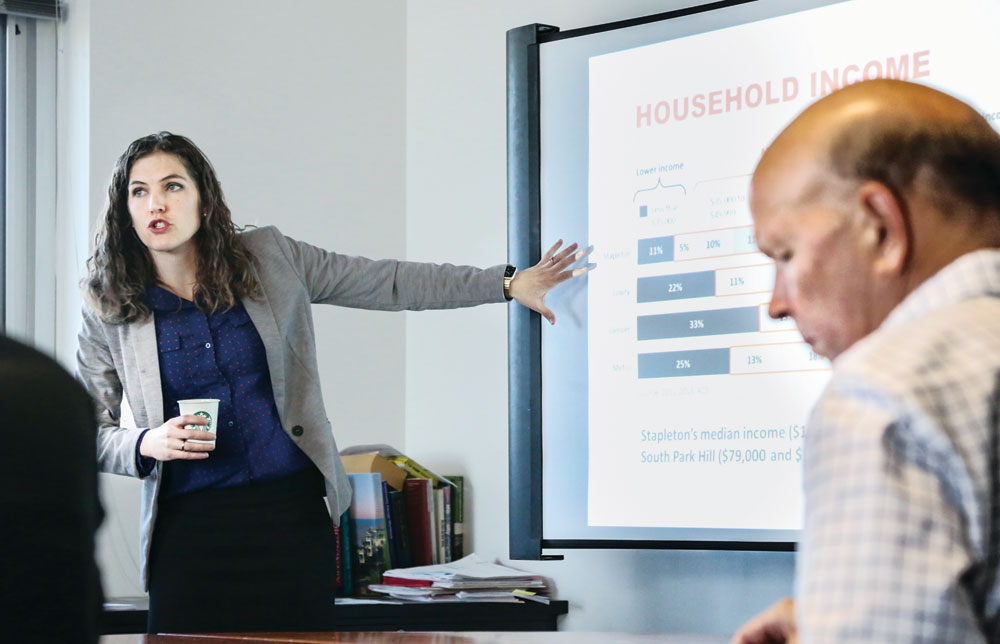
Mollie Fitzpatrick presents information from BBC Research’s study on home affordability in Stapleton to the Stapleton Foundation board. Forest City Senior Vice President Jim Chrisman is seated at right.
Each time a property is sold in Stapleton, a “community fee” is paid to the Stapleton Foundation (“Foundation”) to support education, transportation and wellness programs that benefit the broader community. The Foundation receives upwards of a million dollars annually from this “Community Investment Fee” (CIF), which is equal to 0.25 percent of the sales price after the first $100,000.
The Foundation’s chief executive officer, Landri Taylor, told the Front Porch he will recommend to the Stapleton Foundation board that funds from the CIF be used to preserve existing affordable for-sale housing units in Stapleton. Deed restrictions place a cap on the price at which such units can be sold during a 15-year period. Next year, for the first time, affordable for-sale units will begin “timing out” of the program.
A report prepared for the Foundation by BBC Research & Consulting in September estimated that by 2031, all of the 391 existing affordable homes in Stapleton at the time of their study could reach the end of their deed restrictions. Those restrictions place a 3.5 percent per year cap on the price appreciation that the owner can gain on resale. To keep homes in the affordable program, the city has the option to purchase the home at the restricted maximum sale price in the first sale after the deed restriction expires.
Stapleton developer Forest City is obligated through its development agreement with the city to provide a minimum of 10 percent of for-sale homes as “affordable” units. According to Tom Gleason of Forest City, as of Nov. 16, 503 affordable homes, (6.8 percent) of homes currently meet that criterion. The existing deed-restricted units are targeted at households earning no more than 80 percent of the area median income (AMI). BBC concluded that without such deed-restricted units, the private sector is unlikely to produce any units affordable even for households earning 100 percent of AMI.

Stapleton Foundation CEO Landri Taylor
Taylor was not prepared to state how much of the CIF dollars would be committed to preserving affordable units. He said it at least depends on how many units will be timing out in any given year. One possible source of matching funds would be the city’s new affordable housing fund. BBC estimates that 40 percent of the existing affordable units are at risk of converting to market rate in the next five years and the remainder will expire by 2032. BBC also stated the price difference between affordable attached units and the median price for a market rate attached home in Stapleton was about $230,000 or $84 per square foot.
BBC estimates the acquisition cost of a home timing out of the program at the maximum sales price, then re-sold to an income-qualified buyer would range from $16,000 to $29,000 per unit. Acquiring all 391 affordable deed-restricted units (at the time of the study) and converting them to a land trust product would cost $5.4 million in 2017 dollars.
Taylor hinted at this new initiative in an Oct. 26 update to the Stapleton Development Corporation (SDC), saying, “We are excited about the possibility.”
Compared to the current deed-restricted model of affordable homes, the advantages of a land trust model are: It preserves affordable units in perpetuity; it benefits more households since price appreciation is permanently capped; and it takes land value out of the equation.
If the Foundation acts on Taylor’s proposal, he would anticipate asking the city if it would be willing to at least partially match the CIF funds to help preserve the affordable units. The Front Porch contacted Denver’s Office of Economic Development but did not receive a reply.
The city’s draft “Housing an Inclusive Denver” plan includes this proposed “key action”: “Explore partnerships across key nonprofit and foundation partners to preserve existing affordable homes in high-opportunity areas, such as Stapleton, to resell to qualified buyers.” It goes on to say, “The City and its nonprofit and foundation partners are already taking steps to explore long-term preservation of these homes to ensure future income-qualified homeowners can purchase homes in these high opportunity areas.” Further, Denver is said to be actively considering formation of a citywide community land trust. Taylor says he will not be recommending that the Foundation create such an entity and would rather work with an existing trust, possibly one to be formed by the city.




You were doing a great job such an excellent article with creative tips. I am so thankful for you and your blog. Thanks for sharing such a informative post to us.
Thanks!
Thanks for this interesting article John! Any chance you could clarify one thing? I’m a little confused on what the fee we pay on home sales is. Is it a kind of tax? Is it something the city of Denver imposes? Or is it more a contractual obligation we enter into as part of our decision to move to this neighborhood? Kind of like our obligation to the MCA but a one time vs ongoing obligation? Thanks for the reporting. It’s nice to hear about some of their plans.
The fee is a kind of tax. Before the Taxpayers Bill of Rights (TABOR) came along in 1992, this kind of fee was in fact known as a real estate transfer tax. It tended to be imposed in resort communities who were trying to raise revenues for things like affordable housing or open space acquisition in the face of growth, land speculation and rising real estate values.
When plans for the redevelopment of Stapleton were being formulated in the mid 1990’s, the notion of a community investment fee rose out of the same concern that large scale urban development should trigger community-wide benefits such as children’s education, transportation, health and affordable housing. The fee is collected by the Master Community Association and transferred to the Foundation for Sustainable urban Communities (historically referred to as the Stapleton Foundation). That foundation has a broad mandate to guide redevelopment that supports healthy living, lifelong learning, neighborhood connections and sustainable development. That last principle, sustainable development, has as a major component affordable housing. As real estate values and incomes in Stapleton continue to rise, the issue of affordable housing has become a higher priority for the foundation. With a continuing source of income like the community investment fee at its disposal, the foundation is now seriously considering using some of those funds to preserve existing affordable housing units as they approach the end of the deed restrictions on their resale price.
Mechanically, the CIF consists of a 0.25 percent fee imposed on the price of properties sold in Stapleton (after exempting the first $100,000 in value). The fee is imposed each time the property is sold. It is not a one-time fee. In 2016, the fee generated $1,091,077 for the foundation. The MCA collects the fee and transmits it to the foundation after retaining five percent for administration.
The amount of CIF money that might be used by the foundation for preserving affordable housing units is unknown and depends on factors such as how many affordable housing units will time out of their deed restrictions in any given year and on the ability of the foundation to leverage funding from other organizations. The foundation has indicated they would prefer to work with another entity, such as a community land trust, so that the preserved units would remain affordable in perpetuity. Such trusts would own the land on which the affordable units are located and would provide homeowners long-term leases to occupy that land. Taking land off the market is one way to achieve lower-cost housing.